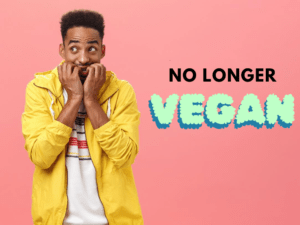Despite veganism gaining a lot of popularity, many people don’t end up sticking with it. Maybe you have a friend who was vegan and suddenly quit or you yourself tried going vegan and found it challenging to maintain. But why is that? Let’s look at the why’s and explore 35 reasons why some people decide not to stay vegan. These reasons vary from concerns about health to challenges and misconceptions surrounding veganism.
It’s important to understand that the decision not to stay vegan can be influenced by different factors and everyone’s experience is unique. By understanding these factors you can have discussions and provide support for those who are considering or currently following a vegan lifestyle.

No Longer Vegan: Why People Don’t Stay Vegan:
1. Nutritional Concerns:
A MAJOR misconception I always see is protein intake. People will almost always ask vegans: “uhh so HOW do you get your protein”. A lot of people think vegan diets don’t provide enough protein. Or don’t even know the daily protein intake to begin with. However the myth that a vegan diet doesn’t contain enough protein can be debunked by looking at all the diverse plant based protein alternatives in a vegan diet. You can get enough protein on a vegan diet.
Some people may also struggle to meet their needs on a vegan diet especially when it comes to obtaining nutrients like B12, iron, omega 3 fatty acids and vitamin D. The fear of deficiency often arises from misinformation.
This misconception can be dismantled by understanding the sources of nutrients like B12, iron and omega 3 fatty acids. By educating ourselves about vegan nutrition we can address concerns about missing out on nutrients.
2. Limited Food Options:
In some areas or communities it can be hard to find affordable vegan food options. This can be a challenge for people who are trying to be vegan. As a result, this can lead to thinking that that vegan diets limit your food choices. However by exploring plant based ingredients and cooking techniques you can bring excitement and variety to your vegan cooking.
3. Social Pressure:
Social pressure is another important one. If someone lives somewhere where veganism isn’t popular or where they’re the only vegan in your circle of friends, it can be challenging. These situations can put pressure on individuals to conform to norms and stray away from their vegan principles.
4. Taste Preferences:
For some people adapting to the taste and texture of plant based alternatives can be a challenge, especially if they go vegan cold turkey all at once and you’ve grown up with a diet that heavily relies on animal products.
5. Health Misinformation:
Misinformation or misconceptions about the health benefits and risks of a vegan diet can discourage people from sticking to being vegan especially if they get non-qualified advice.
6. Cultural and Culinary Attachments:
Some people grow up in places with strong emotional ties rooted in culture or culinary traditions centered around animal-based foods. For example: French and Argentinian food is very meat-based with a lot animal-derived products like cheese. This can make it tougher for individuals to embrace a vegan lifestyle.
7. Limited Community Support:
Finding a community and connecting with like minded individuals can be quite challenging in itself. Now let’s add being vegan on top of that. It’s important to find local or online communities for support on a vegan journey. Feeling isolated due to the absence of a community or friends who follow a vegan lifestyle can increase the chances of people giving up on veganism.
8. Convenience and Time Constraints:
Our busy lifestyles often prioritize convenience. Some people can perceive plant based meals as time consuming compared to available non vegan options. This misconception that meal preparation as a vegan is time consuming can discourage individuals with on-the-go schedules.
9. Financial Constraints:
There is a misconception that following a vegan diet is expensive. This is common for people who are not aware of budget plant based alternatives. Yup- they exist. There’s so many things vegan food you can prepare for really cheap.
10. Ethical Fatigue:
The constant exposure to ethical concerns associated with animal agriculture can take a toll on some people making them feel overwhelmed and eventually push them away.
11. Health Issues:
Some people have health conditions or dietary needs that require them to include animal products in their diet. This means they can’t really be vegan because their health doesn’t allow them to.
12. Unrealistic Expectations:
Having expectations regarding health improvements or rapid weight loss from a vegan diet can lead to disappointment and ultimately result in people giving up on the lifestyle when they don’t actually get quick results.
13. Lack of Culinary Skills:
Not everyone is a chef Ramsey or has basic cooking skills. They may lack the cooking or knowledge skills to prepare tasty and satisfying vegan meals, which can lead to dissatisfaction and a higher chance of going back to familiar non vegan options.
14. Dependency on Processed Foods:
Depending heavily on processed vegan alternatives, which often contain high amounts of sugars, unhealthy fats and additives can contribute to dissatisfaction with the vegan diet.
15. Inconvenient Traveling:
Traveling to areas with limited vegan options can be challenging for some. This can lead people to temporarily or permanently deviating away from a plant based life and become no longer vegan.16. Peer Influence:
Individuals might feel pressure from friends, family or coworkers who do not understand or support their decision to follow a vegan lifestyle. This influence could lead them to ditch veganism.
17. Psychological Factors:
Mental health issues, like stress, anxiety or depression can play a role in how some individuals turn to eating habits. This can make it challenging to stick to dietary restrictions, including a vegan diet.
18. Dietary Fads:
Some people may adopt a vegan diet because it’s trendy or fashionable but when the trend loses popularity, so does their commitment to a plant based lifestyle.
19. Perception of Bland Meals:
If you’ve ever heard of vegetarian or vegan food referred to as rabbit food then you know what I’m talking about. The perception that vegan meals are bland or lack flavor can discourage people from being vegan.
20. Misleading Marketing:
The perception that certain processed or packaged vegan foods are inherently healthier may lead individuals to make less-than-ideal food choices. This can impact their overall health and satisfaction with a vegan lifestyle.
21. Environmental Challenges:
In areas where access to sustainably sourced plant based foods is limited, some people can find it hard to align their environmental concerns with finding suitable vegan options
22. Pregnancy and Parenting Concerns:
Some pregnant women may have concerns about meeting the needs of their pregnancy or raising children while following a vegan diet. Should they stay vegan during their pregnancy? Should they raise their children vegan? How would they do that? These concerns and stressful decisions may lead them to reintroduce animal products for perceived nutritious benefits.
23. Lack of Time for Education:
Some people have limited time to educate themselves about a vegan diet. This lack of knowledge makes them more likely to give up on veganism.
23. Inconsistent Motivation:
Some people may initially go vegan for specific reasons like weight loss or a short-term health goal. But when these motivations fade so does their commitment to veganism.
24. Perceived Inconvenience:
A vegan diet can be perceived as inconvenient by some in terms of finding restaurants or meal prep. This can make people want to give up veganism.
25. Medical Conditions:
Certain medical conditions or allergies may restrict an individual’s ability to consume a variety of plant based foods making it difficult for them to be strictly vegan.
26. Lack of Vegan Role Models:
Although there are a handful of vegan celebrities and role models, they aren’t that many after all. The absence of known vegan role models or celebrities can make people who want to be vegan feel isolated potentially affecting their motivation to stay dedicated.
27. Cultural Stigma:
In some cultures veganism can be looked down upon or misunderstood. This makes it challenging for individuals to stick to their commitment when faced with societal pressures or judgment.
28. Unrealistic Weight Expectations:
Some people may go vegan to lose weight, but then when that doesn’t happen they may go back to their old eating habits.
29. Limited Vegan Convenience Foods:
It can be hard to find affordable and readily available vegan food for some folks with busy schedules.
30. Personal Cravings:
Although, I do believe you can veganize nearly anything. Strong cravings for non-vegan foods whether due to emotional connections or past habits can create obstacles that some individuals struggle to resist.
31. Inadequate Planning:
Lack of proper meal planning and preparation means some won’t be able to enjoy satisfying and nutritious vegan food.
32. Poor Social Support System:
When people don’t receive understanding or support from their friends, family or community it can be tough for them to maintain a vegan lifestyle (because they constantly face resistance and opposition).
33. Feeling Isolated at Social Events:
The majority of the time, social events have non-vegan food, which can make vegans feel isolated.
34. Lack of Supportive Healthcare Professionals:
Some people can encounter healthcare providers who are unfamiliar with or skeptical of vegan diets who may advise against a vegan diet.
35. Setting Unrealistic Expectations:
Setting yourself up with unrealistic goals can lead to frustration and make you leave veganism. Make sure to set milestones but also celebrate victories on your journey towards a plant based life. Gradual transitions can be more sustainable than going vegan cold turkey for some.
Overall, there are many reasons that can lead people to become no longer vegan. What’s important is understanding them, acknowledging them and addressing misconceptions. The key is listening to your body and finding what works for you and your lifestyle.
FAQs
Can I get enough protein on a vegan diet?
Yes, a well-planned vegan diet can provide sufficient protein through various plant-based sources such as beans, lentils, tofu, and nuts.
How can I navigate social situations as a vegan?
Navigating social situations as a vegan can be managed by communicating your dietary choices in advance, offering to bring a dish, and suggesting vegan-friendly restaurants.
Is veganism expensive compared to a conventional diet?
Veganism can be affordable by focusing on budget-friendly staples like grains, legumes, and seasonal produce. Planning meals and buying in bulk can also save costs.
Can I still enjoy flavorful meals as a vegan?
Absolutely. There is a large misconception that vegan food is bland or tasteless, which is untrue. Experiment with herbs, spices, and diverse plant-based ingredients to create flavorful and satisfying vegan meals.
Found this post on Reasons Why People Don’t Stay Vegan helpful? Pin it now and save it for later.

